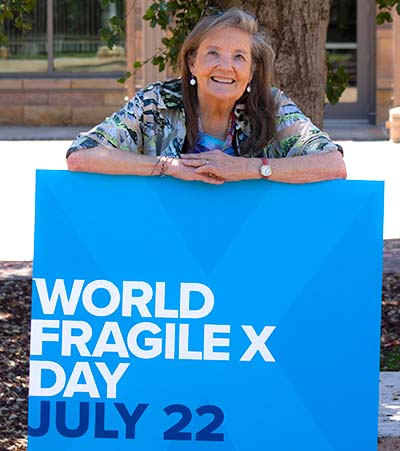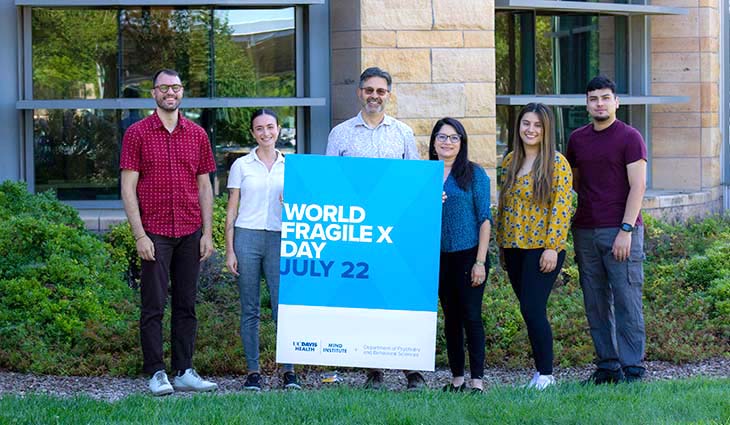MIND Institute marks World Fragile X Day with expert discussion, teal lights
Genetic condition is most common inherited cause of intellectual disability and most common single gene cause of autism
The UC Davis MIND Institute is marking World Fragile X Day, July 22, with an expert panel discussion and a display of teal lights to promote awareness of the genetic condition.
A Facebook Live conversation featuring fragile X experts will take place Wednesday, July 20 at 11 a.m. on the MIND Institute’s Facebook page. The panel will talk about the latest research and take audience questions. The all-star panel will include:

- Randi Hagerman, developmental-behavioral pediatrician, distinguished professor of pediatrics, MIND Institute medical director and internationally recognized expert on fragile X.
- David Hessl, psychologist and clinical professor in the Department of Psychiatry and Behavioral Sciences and director of the International Fragile X Premutation Registry.
- Angela John Thurman, associate professor in the Department of Psychiatry and Behavioral Sciences and prominent fragile X researcher.
- Laura del Hoyo Soriano, neuropsychologist and research scientist in the Department of Psychiatry and Behavioral Sciences and fragile X researcher.
The MIND Institute’s Fragile X Research and Treatment Program is a world leader in the field.
“We at the MIND Institute bring a diversity of expertise to fragile X, spanning pediatrics, psychology, genetics, brain imaging and other fields. Also, we’ve cared for lots of individuals with fragile X over the years!” said Hessl, who will lead the Facebook Live discussion.
Teal for fragile X awareness
The MIND Institute is also displaying teal lights in its rotunda the week of July 18-22 to help raise awareness.
Hundreds of institutions, organizations and businesses all over the world are “going teal” to spread awareness of the genetic condition, which is the leading inherited cause of intellectual disability. Fragile X is also the leading single-gene cause of autism.

What is fragile X syndrome?
Fragile X syndrome (FXS) is a genetic condition. Individuals with FXS have an altered gene, called FMR1, on their “X” chromosome.
It varies, but males are typically more affected by FXS and are more likely to have intellectual disabilities and autistic traits. Often individuals with FXS have physical characteristics such as long faces, larger ears, unusually flexible fingers and flat feet. People with FXS also tend to be very social and friendly, and have strong visual or long-term memory.
FXS affects about 1 in 3,600 to 4,000 males and 1 in 4,000 to 6,000 females.
“Most families and many doctors are not aware of fragile X syndrome and its related conditions,” Hagerman explained. “The diagnosis makes a big difference for treatment. That’s why greater awareness is so important.”
Some people carry a smaller version of the FMR1 premutation and don’t have FXS. They may be largely unaffected or unaware they carry the premutation. But they may develop other related conditions, including:
- FXTAS (Fragile X-associated Tremor Ataxia Syndrome), a neurodegenerative condition that mainly affects older males and females
- FXANC (Fragile X-associated Neuropsychiatric Conditions) which includes anxiety, depression, insomnia, social deficits that can begin in childhood or adulthood
- FXPOI (Fragile-X-associated Primary Ovarian Insufficiency), which affects some female carriers and may impact fertility.
FXTAS was discovered by the MIND Institute’s Randi and Paul Hagerman and their research teams in 2001.
Fragile X runs in families and female carriers can also pass the full genetic mutation on to their children. An estimated 1 in 151 females and 1 in 468 men are premutation carriers.
“Since fragile X is an inherited syndrome, it is important to identify it in families so that they are able to obtain genetic counseling,” Hessl said. “Also, the fragile X premutation ‘carrier’ state is quite common in the population, especially among females.”
One of the most dramatic changes over the last decade is awareness of many new components of premutation involvement and a dramatic expansion of new treatments for fragile X syndrome. There are new treatments that can make a significant difference in quality of life for these patients.”—Randi Hagerman, MIND Institute medical director
Increased awareness of fragile X leads to advances
Research and greater awareness have led to important clinical advances.
“One of the most dramatic changes over the last decade is awareness of many new components of premutation involvement and a dramatic expansion of new treatments for fragile X syndrome, Hagerman said. “There are new treatments that can make a significant difference in quality of life for these patients.”
The fragile X community is very engaged and collaborative, notes Christina Aguirre-Kolb, a clinical psychology fellow who conducts fragile X-related research.
“There is a very strong FXS community, and creating these positive networks encourages positive mental health outcomes. The more we learn about fragile X, the more we can improve our support for those directly affected through evidence-based interventions,” she said.

Fragile X Premutation Registry
The MIND Institute and the National Fragile X Foundation, in partnership with institutions around the world, have launched an international premutation registry, directed by David Hessl. The goal is to facilitate and encourage fragile X research around the world by building a large, diverse list of people interested in taking part in research studies.
Sign up for the International Fragile X Premutation Registry.
Watch the Fragile X Facebook Live July 20 at 11 a.m. here.
Related stories:
New insights into FXTAS could inform future research and clinical trials
The UC Davis MIND Institute in Sacramento, Calif. was founded in 1998 as a unique interdisciplinary research center where families, community leaders, researchers, clinicians and volunteers work together toward a common goal: researching causes, treatments and potential prevention of challenges associated with neurodevelopmental disabilities. The institute has major research efforts in autism, fragile X syndrome, chromosome 22q11.2 deletion syndrome, attention-deficit/hyperactivity disorder (ADHD) and Down syndrome. More information about the institute and its Distinguished Lecturer Series, including previous presentations in this series, is available on the Web at mindinstitute.ucdavis.edu.





